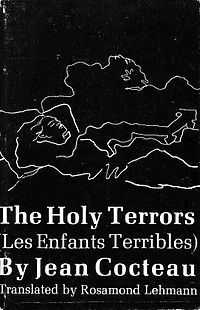Les Enfants Terribles is a 1929 novel by Jean Cocteau, published by Editions Bernard Grasset. It concerns two siblings, Elisabeth and Paul, who isolate themselves from the world as they grow up; this isolation is shattered by the stresses of their adolescence. It was first translated into English by Samuel Putnam in 1930 and published by Brewer & Warren Inc. A later English translation was made by Rosamond Lehmann in 1955, and published by New Directions (ISBN 0811200213) in the U.S., and Mclelland & Stewart in Canada in 1966, with the title translated as The Holy Terrors. The book is illustrated by the author's own drawings. It was made into a film of the same name, a collaboration between Cocteau and director Jean-Pierre Melville in 1950, and inspired the opera of the same name by Philip Glass.
This story concerns the siblings Paul and Elisabeth who start this story without a father and with a bed-ridden mother, whom Elisabeth looks after. At school Paul is obsessed with the feminine looking Dargelos, while Paul’s school friend Gerard is enthralled by the siblings. However after Paul becomes ill when Dargelos throws a snowball with a stone inside at him, Elisabeth cares for both him and their mother. While nursing Paul they start an incestuous love and begin playing the “game”.
The game devised by Paul and Elisabeth often involves the siblings trying to hurt each other's feelings, where the winner is the one that leaves the contest with the last word, a sense of superiority and ideally having caused a display of angry frustration from the other. This game continues after Paul recovers and their mother has died.
Elisabeth soon takes up a job as a model, where she meets Agathe, a girl who was orphaned at a young age after her drug-addicted parents committed suicide. Agathe, characterised by her strong resemblance to Dargelos, soon moves in with Paul and Elisabeth.
Elisabeth is first to get married to a wealthy young man who dies on his way to a business meeting before the married couple can even enjoy a honeymoon. The result of the marriage is that the siblings inherit a large house which they move into. Paul soon finds himself in love with Agathe. Elisabeth cannot stand to see her brother happy, but there is also an element of it being a game to see how much hurt she can inflict. She manages to bully Gerard, who is in love with her, into marrying Agathe and as a result helps break her brother’s heart.
After Agathe and Gerard's marriage, Gerard meets with Dargelos, now a collector of poisons, and sends one of these poisons to Paul, also an enthusiast, as a gift. That poison is taken by Paul to end his life after writing of his love to Agathe. As Paul lies dying he is attended to by Agathe, who finds out about Elisabeth's scheme, and Elisabeth herself. In her final moments, knowing that Paul is dying, Elisabeth senses that this is yet another twist in the game and by dying he has beaten her to the final move. She then shoots herself and by a matter of seconds beats Paul, leaving a frightened Agathe with two dead bodies.
